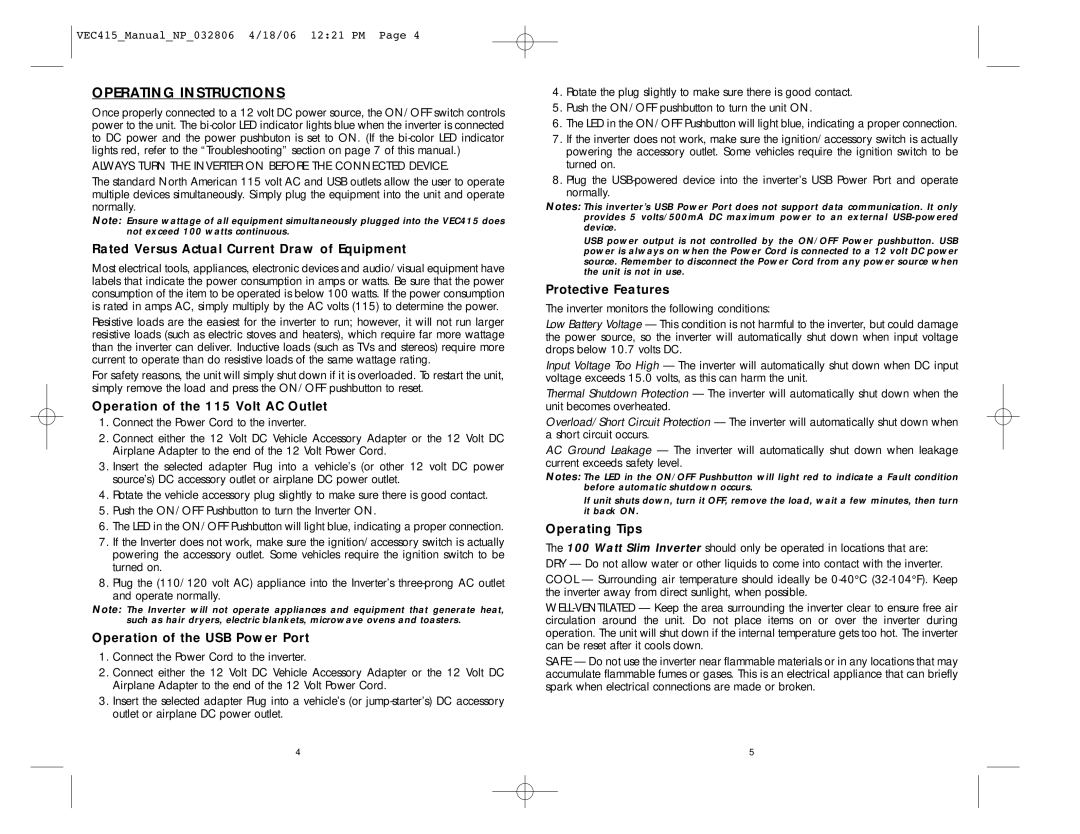
VEC415_Manual_NP_032806 4/18/06 12:21 PM Page 4
OPERATING INSTRUCTIONS
Once properly connected to a 12 volt DC power source, the ON/OFF switch controls power to the unit. The
ALWAYS TURN THE INVERTER ON BEFORE THE CONNECTED DEVICE.
The standard North American 115 volt AC and USB outlets allow the user to operate multiple devices simultaneously. Simply plug the equipment into the unit and operate normally.
Note: Ensure wattage of all equipment simultaneously plugged into the VEC415 does not exceed 100 watts continuous.
Rated Versus Actual Current Draw of Equipment
Most electrical tools, appliances, electronic devices and audio/visual equipment have labels that indicate the power consumption in amps or watts. Be sure that the power consumption of the item to be operated is below 100 watts. If the power consumption is rated in amps AC, simply multiply by the AC volts (115) to determine the power.
Resistive loads are the easiest for the inverter to run; however, it will not run larger resistive loads (such as electric stoves and heaters), which require far more wattage than the inverter can deliver. Inductive loads (such as TVs and stereos) require more current to operate than do resistive loads of the same wattage rating.
For safety reasons, the unit will simply shut down if it is overloaded. To restart the unit, simply remove the load and press the ON/OFF pushbutton to reset.
Operation of the 115 Volt AC Outlet
1.Connect the Power Cord to the inverter.
2.Connect either the 12 Volt DC Vehicle Accessory Adapter or the 12 Volt DC Airplane Adapter to the end of the 12 Volt Power Cord.
3.Insert the selected adapter Plug into a vehicle’s (or other 12 volt DC power source’s) DC accessory outlet or airplane DC power outlet.
4.Rotate the vehicle accessory plug slightly to make sure there is good contact.
5.Push the ON/OFF Pushbutton to turn the Inverter ON.
6.The LED in the ON/OFF Pushbutton will light blue, indicating a proper connection.
7.If the Inverter does not work, make sure the ignition/accessory switch is actually powering the accessory outlet. Some vehicles require the ignition switch to be turned on.
8.Plug the (110/120 volt AC) appliance into the Inverter’s
Note: The Inverter will not operate appliances and equipment that generate heat, such as hair dryers, electric blankets, microwave ovens and toasters.
Operation of the USB Power Port
1.Connect the Power Cord to the inverter.
2.Connect either the 12 Volt DC Vehicle Accessory Adapter or the 12 Volt DC Airplane Adapter to the end of the 12 Volt Power Cord.
3.Insert the selected adapter Plug into a vehicle’s (or
4.Rotate the plug slightly to make sure there is good contact.
5.Push the ON/OFF pushbutton to turn the unit ON.
6.The LED in the ON/OFF Pushbutton will light blue, indicating a proper connection.
7.If the inverter does not work, make sure the ignition/accessory switch is actually powering the accessory outlet. Some vehicles require the ignition switch to be turned on.
8.Plug the
Notes: This inverter’s USB Power Port does not support data communication. It only provides 5 volts/500mA DC maximum power to an external
USB power output is not controlled by the ON/OFF Power pushbutton. USB power is always on when the Power Cord is connected to a 12 volt DC power source. Remember to disconnect the Power Cord from any power source when the unit is not in use.
Protective Features
The inverter monitors the following conditions:
Low Battery Voltage — This condition is not harmful to the inverter, but could damage the power source, so the inverter will automatically shut down when input voltage drops below 10.7 volts DC.
Input Voltage Too High — The inverter will automatically shut down when DC input voltage exceeds 15.0 volts, as this can harm the unit.
Thermal Shutdown Protection — The inverter will automatically shut down when the unit becomes overheated.
Overload/Short Circuit Protection — The inverter will automatically shut down when a short circuit occurs.
AC Ground Leakage — The inverter will automatically shut down when leakage current exceeds safety level.
Notes: The LED in the ON/OFF Pushbutton will light red to indicate a Fault condition before automatic shutdown occurs.
If unit shuts down, turn it OFF, remove the load, wait a few minutes, then turn it back ON.
Operating Tips
The 100 Watt Slim Inverter should only be operated in locations that are: DRY — Do not allow water or other liquids to come into contact with the inverter.
COOL — Surrounding air temperature should ideally be
SAFE — Do not use the inverter near flammable materials or in any locations that may accumulate flammable fumes or gases. This is an electrical appliance that can briefly spark when electrical connections are made or broken.
4 | 5 |
